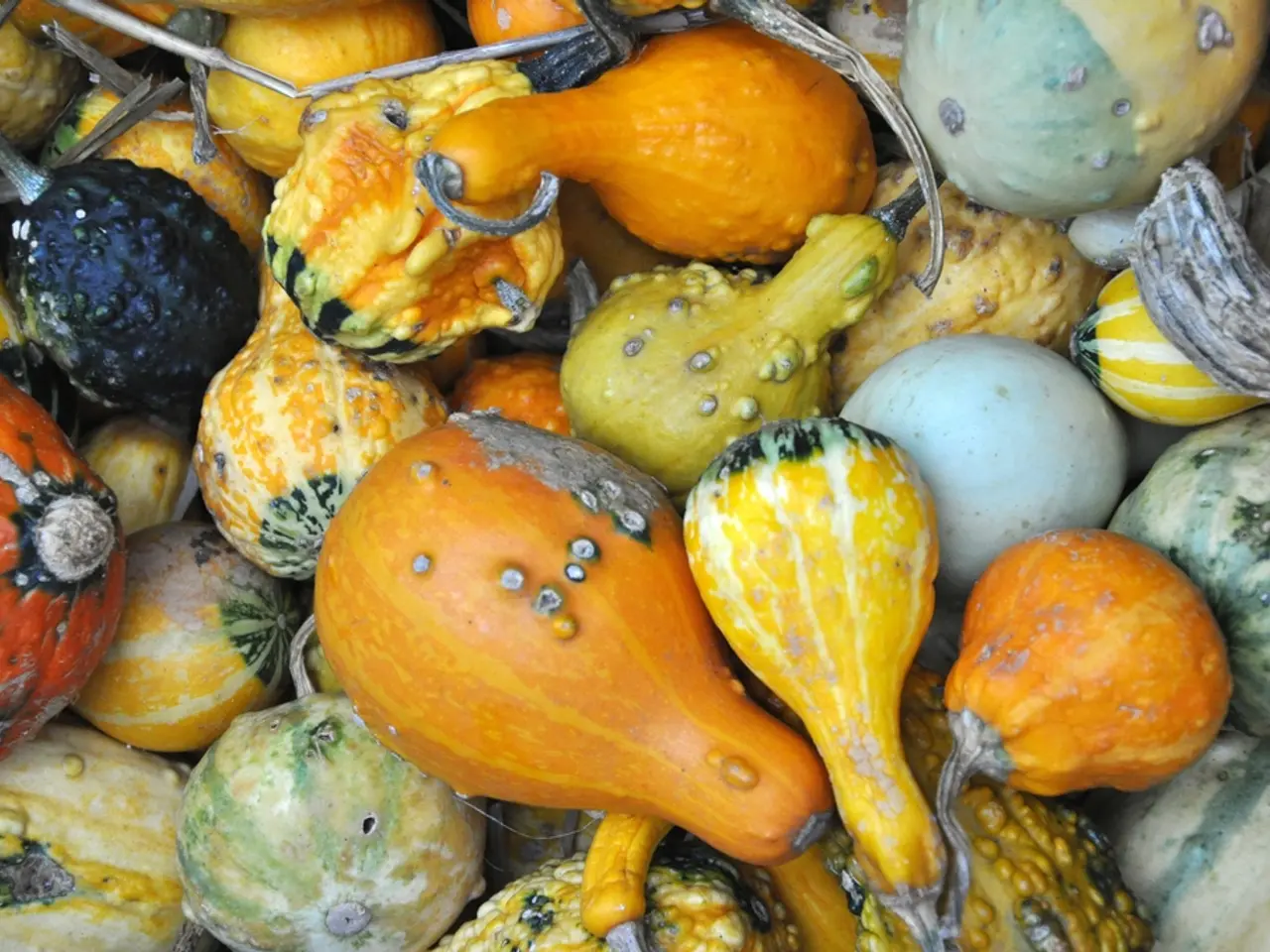Dietary recommendations for multiple myeloma patients: Optimal foods to consume and avoid for effective management
For individuals diagnosed with multiple myeloma, maintaining a balanced and nutrient-rich diet plays a crucial role in managing symptoms and promoting overall health during treatment. Here's a breakdown of the key food groups to focus on and those to avoid.
**Protein Sources**
Lean meats, fish, poultry, eggs, tofu, dairy products, nuts, dried beans, lentils, and chickpeas provide essential protein for muscle maintenance and immune function.
**Vegetables**
Cruciferous vegetables like broccoli, cauliflower, and cabbage help reduce cancer risk and may support hormone balance. Tomatoes, carrots, peas, pumpkin, turnips offer vitamins and fiber, while green leafy vegetables such as kale and spinach provide calcium, iron, and antioxidants. Asparagus and Brussels sprouts are rich in antioxidants.
**Fruits**
Oranges, bananas, kiwi, peaches, mangoes, pears, strawberries offer vitamins and fiber, while avocados, guava, apricots, figs, prunes, and raisins supply energy and nutrients.
**Carbohydrates and Fiber**
Whole grains like brown rice, oats, wholegrain bread, and pasta help with energy and fiber intake, preventing constipation, a common side effect of some chemotherapy. High-fiber foods such as apples, pears, berries, nuts, beans, lentils, broccoli, carrots, and artichokes are recommended.
**Iron-Rich Foods**
Because anemia is common in multiple myeloma, eating foods high in iron is important. Sources include lean red meat, raisins, bell peppers, kale, Brussels sprouts, sweet potatoes, broccoli, tropical fruits like mango, papaya, pineapple, and guava.
**Fluids**
Adequate hydration is essential to support kidney function and overall health. Water-rich fruits and vegetables such as cucumbers, squash, cantaloupe, and honeydew also provide antioxidants and reduce inflammation.
**Foods to Avoid**
Raw foods that may increase infection risk due to weakened immunity should be avoided. Sugar- and artificially sweetened beverages, as high intake may increase risk related to monoclonal gammopathies, should also be limited.
**Additional Notes**
Some evidence suggests that curcumin (from turmeric) may help reduce chemotherapy resistance. Small, frequent meals may help with treatment-related appetite loss. A neutropenic diet may be recommended depending on immune status, focusing on food safety and avoiding potential contaminants.
A study found that 59 percent of people post myeloma treatment had a vitamin D deficiency. Heme iron, found in animal-based foods, is more readily absorbed by the body than non-heme iron, found in plant foods. A diet rich in plant foods and low in sugar is helpful for cancer prevention as well as support during treatment.
Sources of vitamin B-12 include beef, liver, clams, fish, poultry, eggs, dairy, fortified breakfast cereals, fortified non-dairy milk, such as soy milk, flax milk, or almond milk, and nutritional yeast. Certain vegetables and fruits, such as apples, basil, rosemary, cranberries, cruciferous vegetables (cabbage, broccoli, cauliflower, Brussels sprouts), and blueberries, contain nutrients that exhibit anti-myeloma properties. Vitamin B-12 works together with folate to form red blood cells. Folate is a B vitamin that helps with the formation of red and white blood cells in the bone marrow.
In summary, a multiple myeloma-friendly diet emphasizes lean protein, colorful fruits and vegetables (especially cruciferous types), whole grains, and iron-rich foods, while ensuring hydration and food safety to reduce infection risk and manage symptoms effectively during treatment.
- An individual diagnosed with multiple myeloma may benefit from a balanced diet focused on proteins from lean meats, fish, poultry, eggs, tofu, dairy products, nuts, dried beans, lentils, and chickpeas.
- Cruciferous vegetables like broccoli, cauliflower, and cabbage can help reduce cancer risk and support hormone balance.
- Fruits such as oranges, bananas, kiwi, peaches, mangoes, pears, strawberries, avocados, guava, apricots, figs, prunes, and raisins offer various vitamins, fiber, and energy.
- Whole grains like brown rice, oats, wholegrain bread, and pasta provide energy and fiber, helping prevent constipation, a common side effect of some chemotherapy.
- Due to the risk of anemia, foods high in iron like lean red meat, raisins, bell peppers, kale, Brussels sprouts, sweet potatoes, broccoli, tropical fruits, and guava should be included in the diet.
- Adequate hydration is vital for supporting kidney function and overall health, with water-rich fruits and vegetables offering antioxidants and reducing inflammation.
- Raw foods that may increase infection risk should be avoided due to weakened immunity, and sugar- and artificially sweetened beverages should be limited.
- Some evidence suggests that curcumin, found in turmeric, may help reduce chemotherapy resistance.
- A well-balanced, nutrient-dense diet with an emphasis on plant foods and low in sugar is helpful for cancer prevention and support during treatment, while ensuring food safety to manage symptoms effectively during multiple myeloma treatment.




